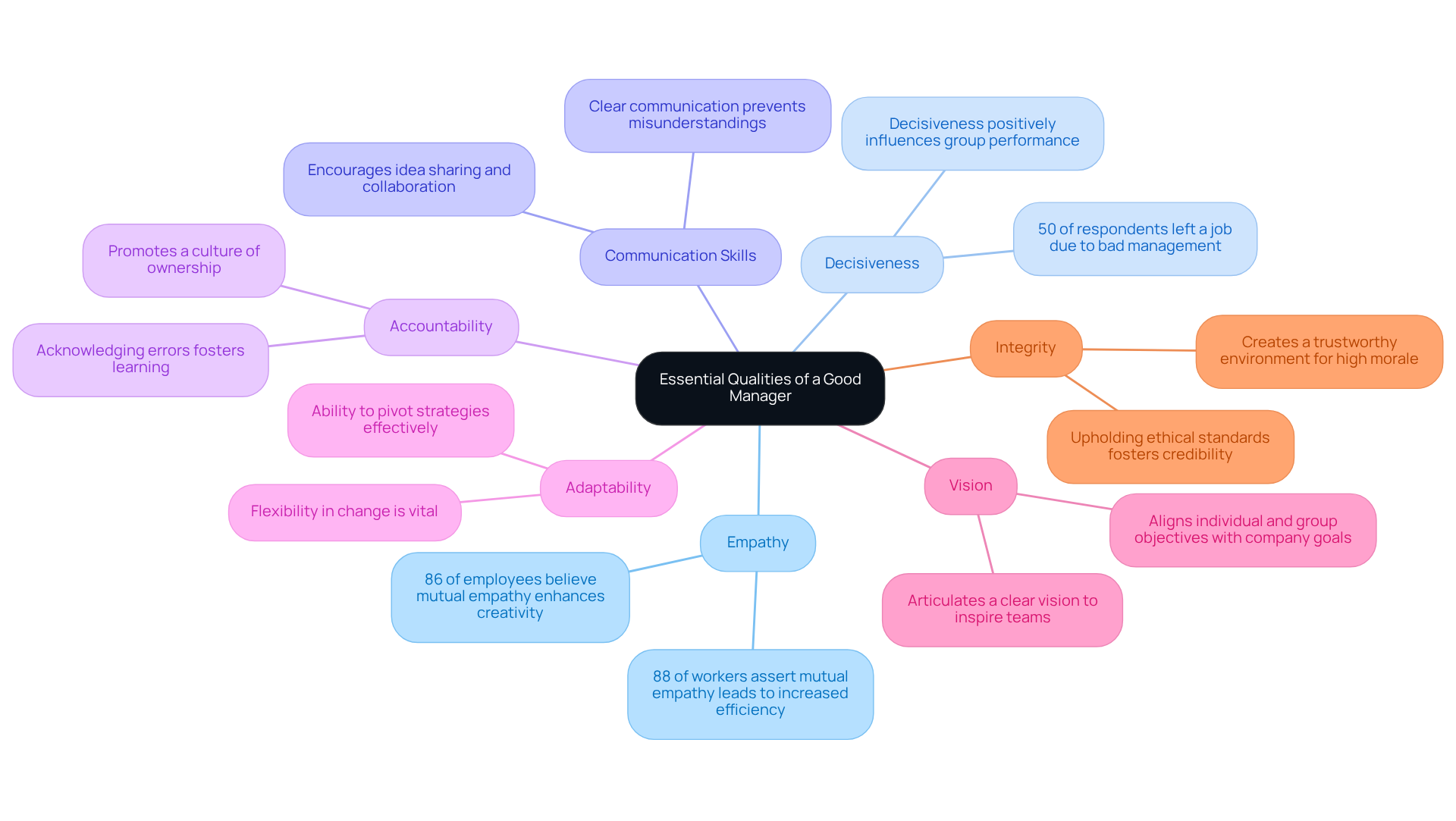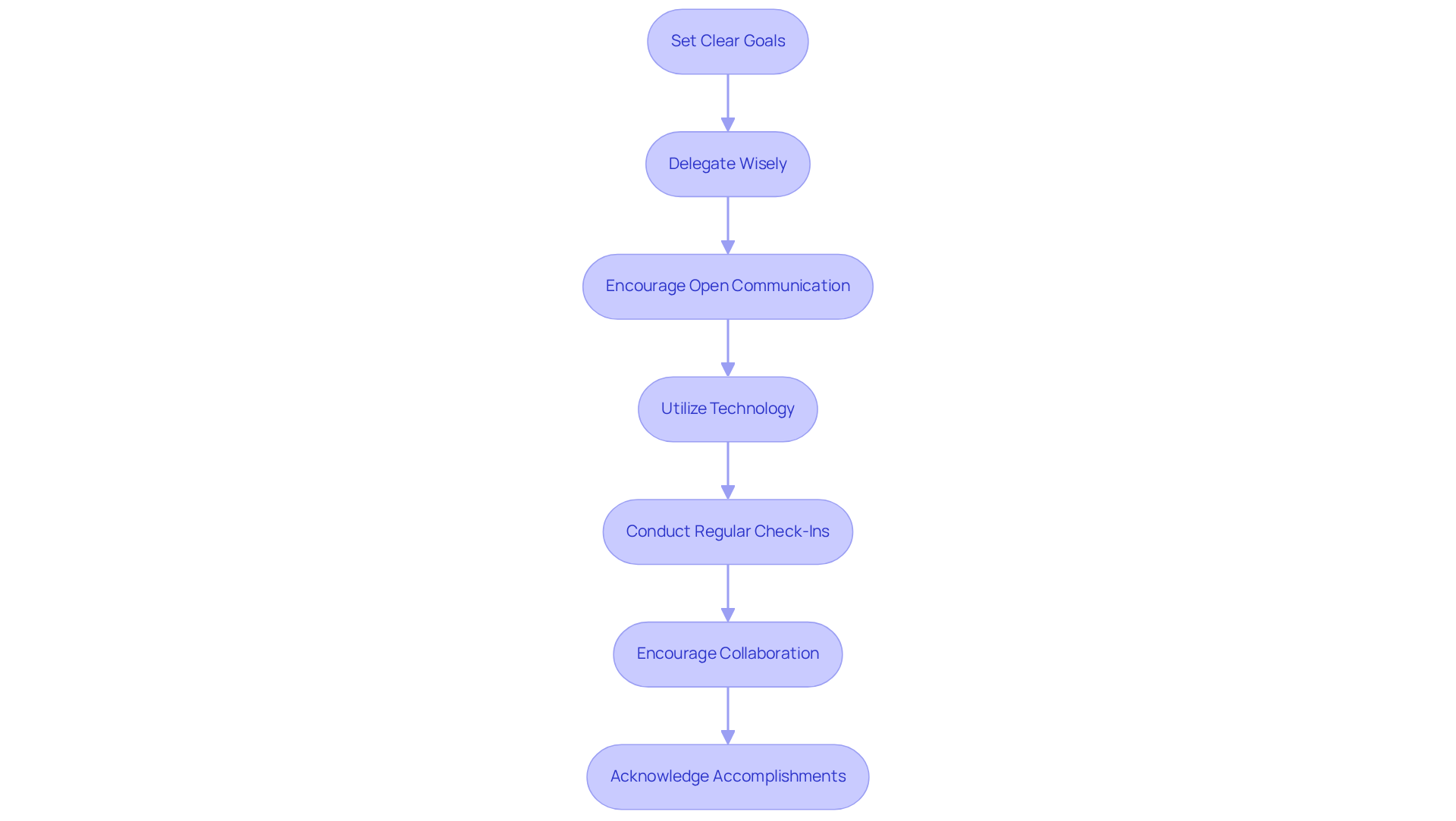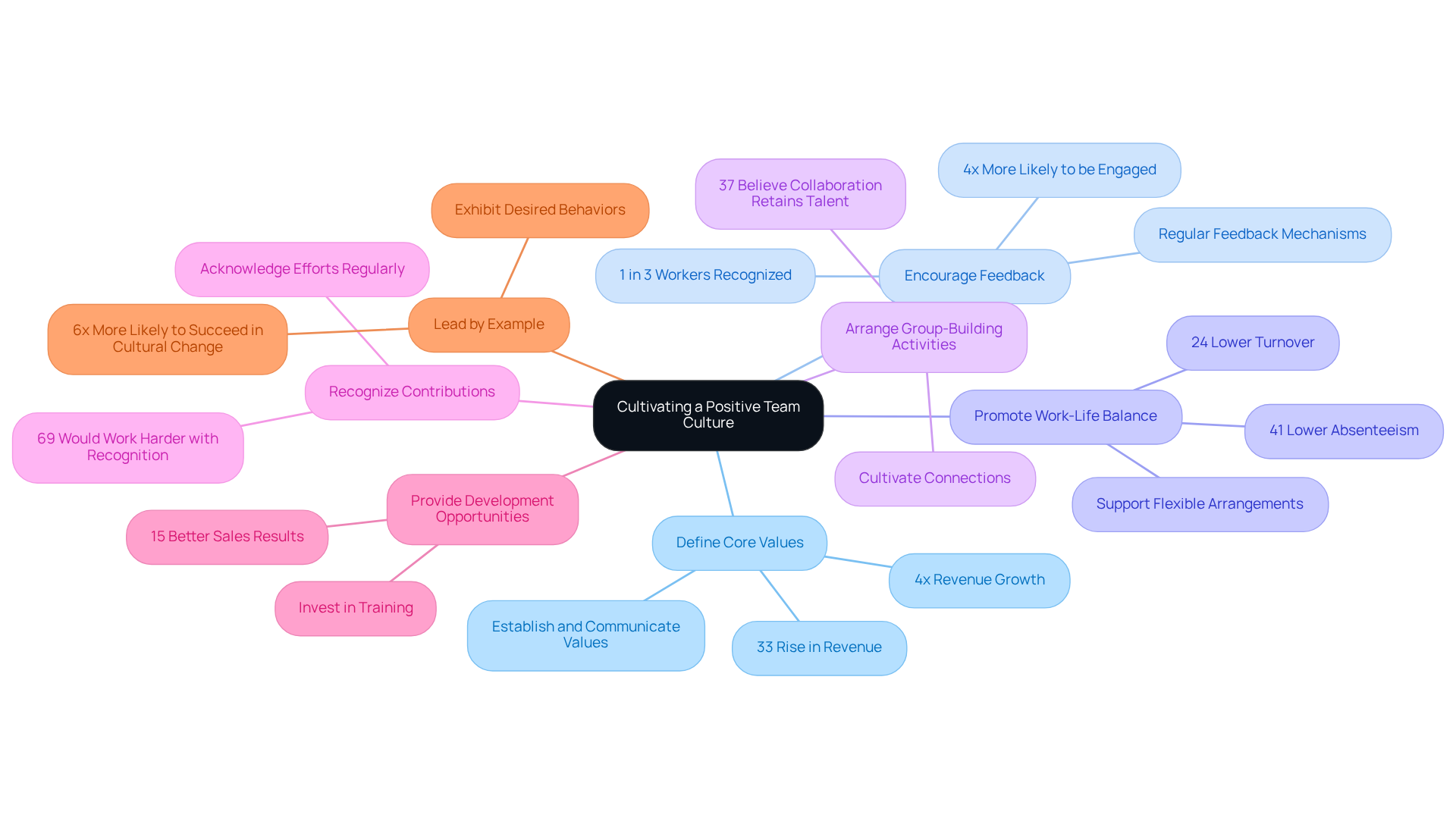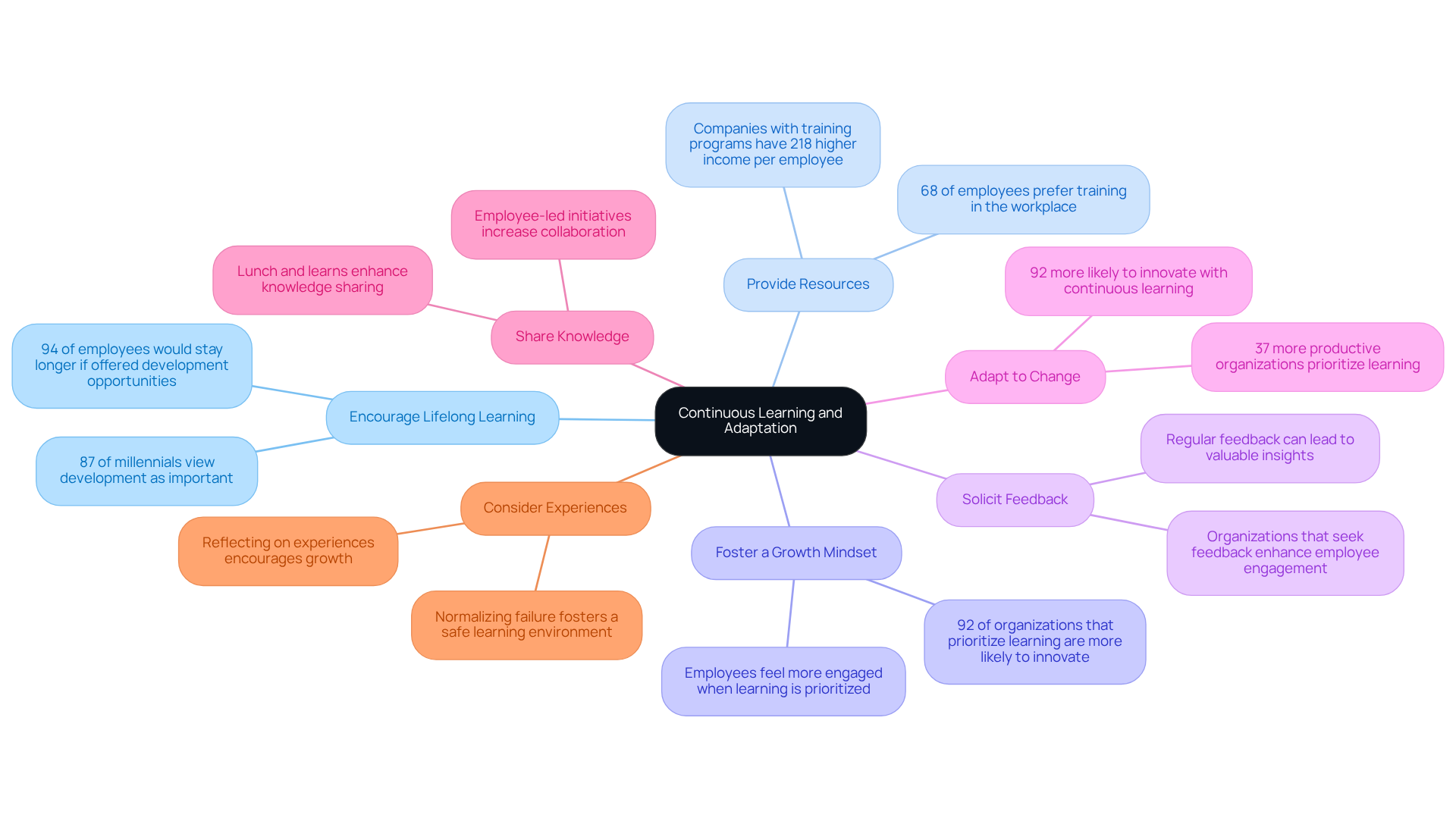Overview
To be an effective manager, one must embody essential qualities such as:
- Empathy
- Decisiveness
- Communication skills
- Accountability
- Adaptability
- Vision
- Integrity
These attributes collectively foster a positive and productive work environment. How do these qualities influence your team's dynamics? This article illustrates that these traits not only enhance morale but also drive performance and engagement. Their critical role in effective leadership cannot be overstated.
Introduction
Effective management serves as the backbone of any successful organization. Yet, the journey to becoming a proficient manager is often riddled with challenges. By honing essential qualities such as empathy, decisiveness, and adaptability, managers can elevate their leadership skills and foster a thriving team culture.
But what occurs when these qualities collide with the fast-paced demands of modern business? This article delves into the key traits and strategies that define effective management, offering insights on how leaders can navigate the complexities of their roles while cultivating a motivated and high-performing team.
Identify Essential Qualities of a Good Manager
To be an effective manager, one must embody several key qualities:
-
Empathy: Understanding colleagues' perspectives fosters trust and collaboration. Research indicates that 86% of employees believe mutual empathy enhances creativity and job satisfaction. Additionally, 88% of workers assert that mutual empathy between company leaders and employees leads to increased efficiency. This makes empathy a cornerstone of effective management.
-
Decisiveness: The ability to make informed decisions quickly is crucial in dynamic environments. Research shows that decisiveness positively influences group performance, with capable managers leading their units through challenges with assurance. Gallup's study revealed that about 50% of respondents left a job due to bad management, underscoring the consequences of poor decisiveness in leadership.
-
Communication Skills: Clear and open communication helps prevent misunderstandings and aligns group goals. Reliable communication is essential for fostering a positive workplace, as it encourages idea sharing and collaboration.
-
Accountability: A good manager takes responsibility for their actions and those of their group, promoting a culture of ownership. By acknowledging errors, managers establish a model that promotes learning and development among the group.
-
Adaptability: Being flexible in the face of change allows managers to navigate challenges effectively. The ability to pivot and adjust strategies is vital in today’s fast-paced work environments.
-
Vision: A strong manager articulates a clear vision that inspires and motivates the group. Effective leaders can align individual and group objectives with broader company goals, fostering a sense of purpose.
-
Integrity: Upholding ethical standards fosters credibility and respect among group members. Managers who demonstrate integrity create a trustworthy environment, which is essential for high employee morale and retention.
By concentrating on these attributes, managers can understand how to be a good manager and establish a solid basis for effective leadership and group success.

Implement Effective Management Strategies
To implement effective management strategies, consider the following steps:
- Set Clear Goals: Begin by defining specific, measurable, achievable, relevant, and time-bound (SMART) objectives for your group. This approach not only clarifies expectations but also aligns efforts with high-impact activities, ensuring that everyone is working towards common objectives.
- Delegate Wisely: Assign tasks based on the strengths and areas for improvement of individuals. Effective delegation fosters a sense of ownership and engagement, which is crucial for maintaining morale and productivity. Research shows that groups with clear delegation practices experience higher engagement levels, leading to enhanced outcomes.
- Encourage Open Communication: Create an environment where group members feel comfortable sharing ideas and feedback. Open communication enhances collaboration and innovation, enabling teams to adapt swiftly to evolving situations.
- Utilize Technology: Leverage tools like Casy to automate task management and streamline workflows. By minimizing administrative overhead, Casy enables your group to focus on core activities, thereby boosting overall productivity and efficiency.
- Conduct Regular Check-Ins: Schedule one-on-one meetings to discuss progress and challenges. These check-ins provide opportunities for support and guidance, helping to keep projects on track and promptly addressing any issues.
- Encourage Collaboration: Promote teamwork through collaborative projects and brainstorming sessions. Cross-functional groups can reduce dependencies and accelerate decision-making processes, which is vital for startups navigating complex environments.
- Acknowledge Accomplishments: Celebrate both personal and group successes to enhance morale and motivation. Recognition reinforces positive behaviors and encourages sustained high performance.
By implementing these strategies, managers can learn how to be a good manager, enhance their effectiveness, and elevate group performance, positioning their startups for success in a rapidly evolving landscape.

Cultivate a Positive Team Culture
To cultivate a positive team culture, implement the following practices:
- Define Core Values: Establish and communicate the values that guide your team's behavior and decision-making. A robust environment grounded in clear core values can result in a 33% rise in revenue, as it draws talented employees and improves overall performance. Moreover, firms with robust values experienced a 4x rise in revenue growth, highlighting the financial effect of a favorable environment.
- Encourage Feedback: Establish avenues for team members to share their thoughts on processes and environment, ensuring their voices are heard. Regular feedback mechanisms are crucial; studies show that only one in three U.S. workers received recognition for their efforts in the past week, highlighting the need for consistent communication. Employees who feel connected to their organization’s culture are four times more likely to be engaged at work, reinforcing the importance of feedback.
- Promote Work-Life Balance: Support flexible working arrangements and encourage time off to prevent burnout. Engaged employees report 41% lower absenteeism and 24% lower turnover, demonstrating the importance of well-being in maintaining a productive workforce.
- Arrange Group-Building Activities: Cultivate connections through social events, workshops, or group challenges. Successful group development can greatly lower employee turnover, as 37% of workers think that keeping top talent necessitates a solid collaboration.
- Recognize Contributions: Regularly acknowledge individual and group efforts to reinforce a sense of belonging and appreciation. Recognition is vital; 69% of employees would work harder if they received more acknowledgment, which can enhance overall engagement and performance.
- Provide Development Opportunities: Invest in training and professional growth to empower group members. Companies that allocate over 50% of their sales training budget toward management training typically see sales results that are 15% better than those that do not prioritize such training.
- Lead by Example: Exhibit the behaviors and attitudes you desire to observe in your group, such as positivity and resilience. Leaders who communicate a compelling vision for transformation are nearly six times more likely to succeed in cultural change efforts, according to Tracy Lawrence.
By concentrating on these practices, managers can understand how to be a good manager, fostering a flourishing group environment that boosts collaboration and productivity, ultimately resulting in better business outcomes. Additionally, consider the strategies outlined in the case study "Strategies for Successful Culture Change," which provides a structured approach to implementing these practices effectively.

Embrace Continuous Learning and Adaptation
To effectively embrace continuous learning and adaptation, consider implementing the following strategies:
- Encourage Lifelong Learning: Cultivate a culture where team members are inspired to pursue new skills and knowledge. This dedication to continuous education can greatly improve staff engagement and retention, with 94% of individuals indicating they would remain longer at a company that invests in their career development. This statistic highlights the significance of nurturing a learning atmosphere that appreciates individual growth.
- Provide Resources: Ensure access to diverse training programs, workshops, and online courses tailored to your group's specific needs. Companies that invest in comprehensive training programs experience 218% higher income per employee, underscoring the financial benefits of employee development and reinforcing the necessity of providing adequate resources.
- Foster a Growth Mindset: Inspire colleagues to perceive challenges as chances for development instead of barriers. As Amanda Winstead notes, "By implementing continuous learning in the workplace, you communicate to your people that you are committed to their long-term growth, happiness, and success." This mindset not only enhances individual performance but also fosters a more innovative and adaptable group environment.
- Solicit Feedback: Regularly seek input on processes and strategies to identify areas for improvement. Involving staff in this manner cultivates a sense of ownership and can yield valuable insights that propel group success. Research indicates that organizations that actively solicit feedback can enhance employee engagement and performance.
- Adapt to Change: Stay informed about industry trends and be willing to pivot strategies as necessary. Organizations that prioritize continuous learning are 92% more likely to innovate and 37% more productive, emphasizing the importance of adaptability in a rapidly changing landscape.
- Share Knowledge: Establish opportunities for colleagues to exchange insights and learnings with each other. Initiatives like employee-led lunch and learns can enhance collaboration and promote a culture of continuous learning, as demonstrated in case studies where such practices have led to increased engagement and knowledge sharing.
- Consider Experiences: Motivate group members to reflect on their experiences and gain insights from both achievements and setbacks. Normalizing failure as a learning opportunity can foster a safe environment where employees feel empowered to experiment and innovate. Creating an environment where mistakes are normalized can turn failures into coaching opportunities, encouraging experimentation and new ideas.
By prioritizing continuous learning and adaptation, managers can discover how to be a good manager, ensuring their teams remain agile and well-prepared for future challenges, ultimately leading to improved performance and satisfaction.

Conclusion
To cultivate effective management, understanding and embodying the key qualities that define a good manager is essential. Qualities such as empathy, decisiveness, communication skills, accountability, adaptability, vision, and integrity form the foundation for successful leadership. By focusing on these traits, managers can foster a collaborative and productive environment that enhances team performance and drives organizational success.
The article outlines several effective management strategies that strengthen leadership capabilities.
- Setting clear goals
- Delegating tasks wisely
- Encouraging open communication
- Utilizing technology
- Conducting regular check-ins
- Promoting collaboration
- Acknowledging accomplishments
These practical steps contribute to a thriving workplace. Furthermore, cultivating a positive team culture through defined core values, feedback mechanisms, work-life balance, group-building activities, recognition of contributions, and development opportunities plays a pivotal role in enhancing employee engagement and satisfaction.
Ultimately, embracing continuous learning and adaptation is vital for managers navigating the complexities of today's work environments. By fostering a culture of lifelong learning, providing resources for growth, encouraging a growth mindset, soliciting feedback, adapting to change, and sharing knowledge, managers can ensure their teams remain agile and prepared for future challenges. The journey to becoming a good manager is ongoing. By integrating these essential qualities and strategies, leaders can create a positive impact that resonates throughout their organizations.
Frequently Asked Questions
What are the essential qualities of a good manager?
The essential qualities of a good manager include empathy, decisiveness, communication skills, accountability, adaptability, vision, and integrity.
Why is empathy important for managers?
Empathy fosters trust and collaboration among colleagues. Research shows that 86% of employees believe mutual empathy enhances creativity and job satisfaction, while 88% assert it leads to increased efficiency.
How does decisiveness impact management?
Decisiveness is crucial for making informed decisions quickly in dynamic environments. It positively influences group performance, and poor decisiveness can lead to high employee turnover, as indicated by Gallup's study.
What role do communication skills play in effective management?
Clear and open communication helps prevent misunderstandings and aligns group goals. It is essential for fostering a positive workplace and encourages idea sharing and collaboration.
What does accountability mean for a manager?
Accountability means taking responsibility for one's actions and those of the group. It promotes a culture of ownership and encourages learning and development among team members.
Why is adaptability important for managers?
Adaptability allows managers to navigate challenges effectively and pivot strategies in response to changes in fast-paced work environments.
How does a manager's vision contribute to leadership?
A strong vision inspires and motivates the group. Effective leaders align individual and group objectives with broader company goals, fostering a sense of purpose.
What is the significance of integrity in management?
Integrity upholds ethical standards and fosters credibility and respect among group members. Managers who demonstrate integrity create a trustworthy environment, essential for high employee morale and retention.




